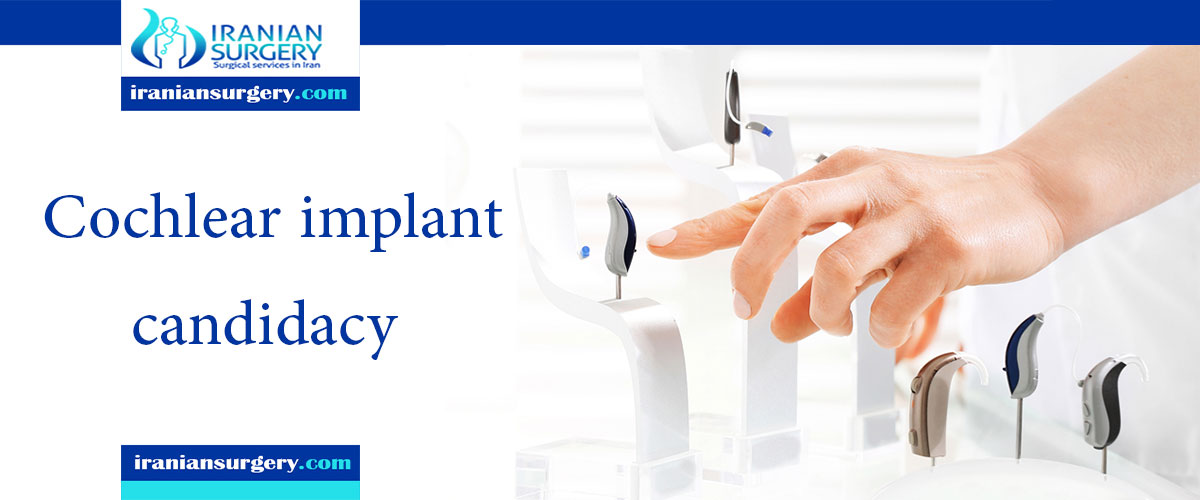cochlear implant candidacy

cochlear implant candidacy
Who is a cochlear implant candidate?
To be eligible for a cochlear implant, you must have:
- Hearing loss that is so severe it interrupts spoken communication
- Limited benefit from hearing aids as determined by specialized hearing tests
- No medical conditions or factors that increase the risks associated with cochlear implants
- High motivation to participate in rehabilitation sessions and to be part of the hearing world
- Clear understanding of what cochlear implants can and cannot do for hearing
Adults
- Individuals 18 years of age or older
- Moderate to profound sensorineural hearing loss in both ears
- Limited benefit from amplification defined by preoperative test scores of ≤ 50% sentence recognition in the ear to be implanted and ≤60% in the opposite ear or binaurally
Children (2-17 Years)
- Severe to profound sensorineural hearing loss in both ears
- Limited benefit from binaural amplification
- Multisyllabic Lexical Neighborhood Test (MLNT) or Lexical Neighborhood Test (LNT) scores ≤ 30%
Children (12-24 Months)
- Profound sensorineural hearing loss in both ears
- Limited benefit from binaural amplification
10 common questions about cochlear implant candidacy
1Who would be a candidate for a cochlear implant?
According to current FDA criteria, the indications for cochlear implantation are bilateral profound sensorineural hearing loss for children ages 12-24 months and severe to profound hearing loss for 2-17 years, along with limited benefit from amplification, including minimal or no progress on age-appropriate auditory ...
2What are the criteria for getting a cochlear implant?
Adult Criteria for Cochlear Implants
Criteria for adult cochlear implantation at UW Hospital and Clinics include: 18 years or older. Moderate-to-profound sensorineural hearing loss in both ears. Inability to benefit from a hearing aid or other prosthetic device for communication
3Will Medicare pay for a cochlear implant?
Because cochlear implants are recognized as standard treatment for severe-to-profound nerve deafness, most insurance companies cover them. In 2004, Medicare, Medicaid, the Veteran's Administration and other public health care plans cover cochlear implants
4What is the age limit for a cochlear implant?
The patients were divided into 2 groups (those less than 70 years of age and those at least 70 years of age), and the results were also compared to those of younger adult cochlear implant recipients (less than 60 years of age).
5What is the success rate of a cochlear implant?
A 10-year retrospective analysis of 57 patients showed that the CI malfunctioned in just 4 cases (7 percent). Other studies have found similar results. If implant failure has the highest rate at less than 10 percent of all surgeries, you can assume that your chances for a successful cochlear implant are pretty high
6Can you swim with a cochlear implant?
The cochlear implants can be fully submerged
They are able to be completely submerged under water. ... Having cochlear implants that are waterproof will be so beneficial when he starts swimming lessons because he will be able to hear his instructor without having to rely on lip reading and sign.
7Can adults get cochlear implants?
Cochlear Implants for Adults. For adults with moderate-to-profound hearing loss, cochlear implants can make a significant difference in their quality of life. ... Hearing aids amplify sounds so they may be detected by the ears. Cochlear implants bypass damaged portions of the ear and directly stimulate the auditory nerve
8Can you have a CT scan with a cochlear implant?
Can I undergo X-ray, CT Scan or MRI even if I have an implant? Users of MED-EL cochlear implants may undergo Xray and CT scanning. MED-EL cochlear implants are safe for MRI scanning without surgical removal of the magnet under special circumstances.
9What is the best age to get a cochlear implant?
Since 2000, cochlear implants have been FDA-approved for use in eligible children beginning at 12 months of age. For young children who are deaf or severely hard-of-hearing, using a cochlear implant while they are young exposes them to sounds during an optimal period to develop speech and language skills
10Is cochlear implant surgery painful?
A cochlear implant is a small electronic device that can help you hear if you have severe or total hearing loss. Your doctor made a cut, called an incision, behind your ear. ... You may have mild to moderate pain in and around your ear and have a headache for a few days.
[kkstarratings]


